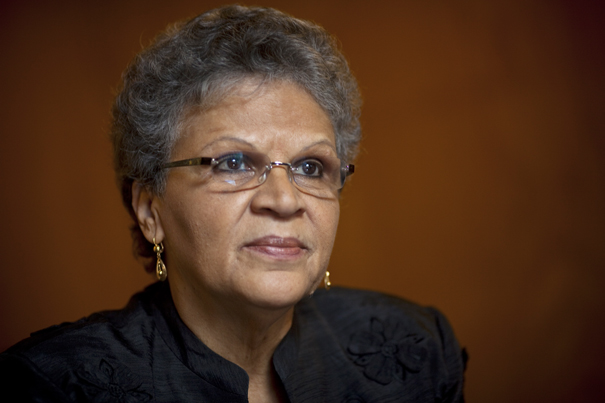
Justin Ide/Harvard Staff Photographer
What Haiti needs … now
Former prime minister details post-earthquake needs
Shelter from the season’s pounding rains, a jump-start for earthquake-stalled classrooms, and employment for those robbed of work by Haiti’s Jan. 12 quake top the list of needs in the disaster-stricken nation, a former prime minister said during an interview while visiting the Harvard Kennedy School.
Michèle Pierre-Louis, who was the island nation’s prime minister for a year until last September, said Haitians should salute the international outpouring of aid for her country. But she added that, despite the aid, many people remain homeless, and their frustration is rising. During a trip to one of the smaller displaced-persons camps in Port-au-Prince in early March, Pierre-Louis said several people told her that she was the first nonmedical person to visit.
Pierre-Louis, who runs the nonprofit Knowledge and Freedom Foundation, was at the Kennedy School on a weeklong visiting fellowship. She said Haiti’s most immediate problem is what to do with the million or so people made homeless by the quake, many of them huddled in makeshift settlements that have sprung up around the city. Making their plight worse, she said, is that the rainy season has begun, making the camps a muddy mess and the leaky shelters uncomfortable.
“It’s a big problem. To me, that’s urgent,” Pierre-Louis said. “People are extremely frustrated. Nobody speaks to them except for the doctors.”
Beyond the housing problem, Pierre-Louis said another important concern is education. Five thousand schools collapsed, she said, and the quake affected more than a million students. All of the nation’s universities were damaged.
“How are we going to restore education? Is it time to rethink the educational system in Haiti?” Pierre-Louis asked.
Jobs are another critical issue, she said. Haitians are willing to work — and to spend what they earn to stimulate the economy — if only they can get jobs. She said international organizations in Haiti should conduct their operations with a mind to employing Haitians whenever possible.
“Frustration will grow if people are sitting in the mud doing nothing,” Pierre-Louis said.
Overall, she said, the quake’s toll of many thousands dead and wounded shows how inadequate everyday conditions are in Haiti. The many deaths, the large number of buildings that collapsed, and the inability of social structures to function properly all need to be addressed in a nation prone to natural disasters.
Several such issues are likely to be addressed at a donor conference scheduled for March 31 in New York, she said. The “International Donors’ Conference Towards a New Future for Haiti” will be held at the United Nations and will feature representatives of Haiti’s government and of several major donor nations. They will discuss Haiti’s development needs and priorities for future aid.
In addition to the many dead and the large number of damaged buildings, Port-au-Prince lost 600,000 residents who left the city to live with family members in the countryside. Pierre-Louis said the capital city has lost nearly a third of its pre-quake population.
Despite the tragedy, Pierre-Louis said that Haiti in the end will have an opportunity to renew itself. As donor nations plan future aid, she said, they should consider infrastructure upgrades. The limitations of Port-au-Prince’s small airport and lone port were clearly illustrated early in the catastrophe. The poor condition of the nation’s roads also is well-known. At the World Economic Forum in Davos, Switzerland, in January, Pierre-Louis said she was surprised at the strong interest from entrepreneurs willing to do business in Haiti.
“I said, ‘My God, we should not miss that opportunity.’”





